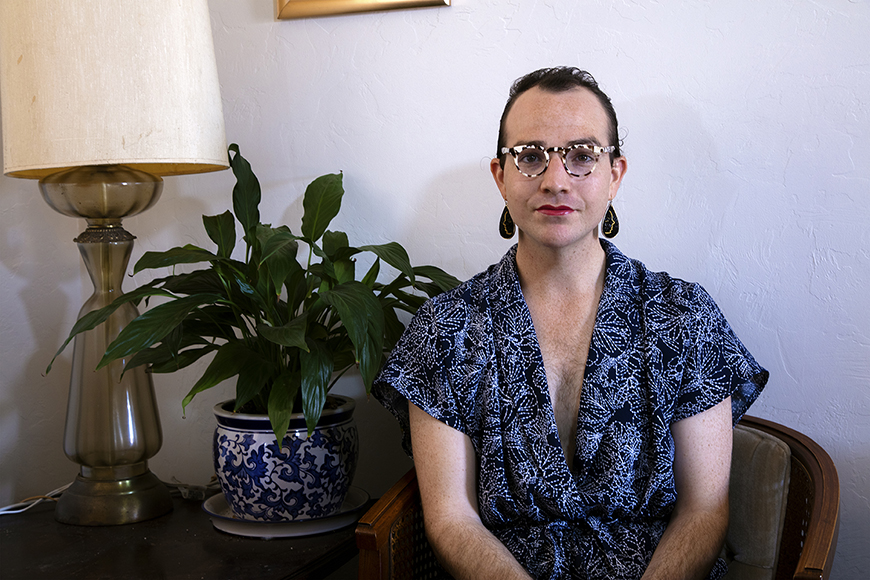
The University Libraries Speaker Series welcomes Pittsburgh Queer History Project (PQHP) co-founder Harrison Apple as featured speaker for the Fall 2020 semester. The theme of this year's speaker series focuses on community archiving and its place within the dominant culture, and Harrison's upcoming talk 'I Can't Wait for You to Die: A Community Archives Critique from the Pittsburgh Queer History Project' addresses this further by discussing the origins and revised mission of PQHP, and the role of community archival practice in critically reassessing institutional archives. Find out more about Harrison and the PQHP below.
1. Tell us a little about yourself.
I am the co-founder (with Dr. Tim Haggerty and Dani Lamorte) of the Pittsburgh Queer History Project, and a PhD Candidate of Gender and Women's Studies at the University of Arizona. After beginning the PQHP around 2014 for the exhibition 'Lucky After Dark: Pittsburgh's Gay and Lesbian Social Clubs 1960-1990,' I came to the University of Arizona to work with Drs. Susan Stryker, Elizabeth Kennedy, and Jamie Lee. Their work on trans and lesbian community histories as well as archives continues to inspire my own approach to research and have been a great support system. I'm looking forward to defending my dissertation later this year on the gay and lesbian social club's history in context of Pittsburgh's successive urban renewal and economic transformation campaigns.
2. What is the PQHP and how did you come to co-found it?
We're a media preservation project focused on LGBTQ after-hours nightclubs. The project started as an art practice while excavating a veritable time-capsule of a nightclub in East Liberty before it was reopened. The material that was spared from the dumpster pointed to several overlapping communities with drastically different histories who had at some point created a space for themselves there. Quickly, I began to focus on a historical timeline of social clubs as a regional tradition, including their exploitation by local gays and lesbians in the bar business between the 1960s and 1990s. The project has made many changes in its trajectory over the years. I had begun very dedicated to forensically reconstructing the club social world, searching for every piece of physical evidence I could find for exhibition. But listening to what former members had to say when we would sit around their kitchen tables or at a café during a work break, I realized that taking on physical collections was really secondary (if that!) to their present interest in holding onto their own memories and sharing them on their own terms. Since about 2014, we've focused on being a more service-oriented project. We digitize home collections (some of which are exhibited on our online archives website), reconnect long lost friendships, and if we are the last resort - we take on physical materials. We've come to recognize the need for a preservation-in-place practice, rather than trying to become 'the only game in town.'
3. What can attendees plan to hear at your talk?
The core of it is about coming to terms with what archives cannot do. I don't mean practically in terms of available work hours, staff, and money. I mean that archives continue to take on expectations that cannot be fulfilled, but there's little room to think through why that is and what to do about it. Two of those expectations are often combined: to combat erasure through increased collecting. In this talk, I'm going to expand on the refusal of community members to participate in archiving themselves. This is an opportunity to re-examine the tense relationship at the core of archives: 'the documenters' and 'the documented' that shapes the relationship of an archives and a community. I reflect on this dynamic in my dissertation about the political after-life of an underground social club membership. Can you imagine someone or someones who would rather burn their memories than submit them to endless reproduction? I'll be talking about this desire and questioning whether the archives profession is equipped to deal with it.
4. What is the importance of community archives, especially at this moment?
I think that community archives are important in how we respond to the very little power we have over how information about us moves (especially without us knowing.) At this point in my experience helping to steward records of LGBTQ community members, community archives are important for the pleasure they provide in constructing a claim to the past. However, it's tempting to start treating this as a universal experience. In the instance of records that resurface despite desperate attempts to hide their own trace, community archives are also important as an obstacle to appropriation. Especially appropriation by the institutions that were/are responsible for their marginalization.
5. The Fall 2020 semester exhibit (CMU Libraries) is about lack of diversity in institutional archives collecting. Is there anything you don't have in your archive that you wish you did?
This is an interesting question, because every archive produces absence through record stewardship. But I also like it because it asks us to think about whether institutional and community archives have a relationship that could allow them to be compared to one another. When we speak of institutional archives as woefully undiverse, community archives become that diversity that they need. It is then impossible for community archives to exist as something other than a balm for institutions - whose responsibility it then becomes to absorb them. Do we recognize how that happens and by what means? That's what keeps me up at night.
